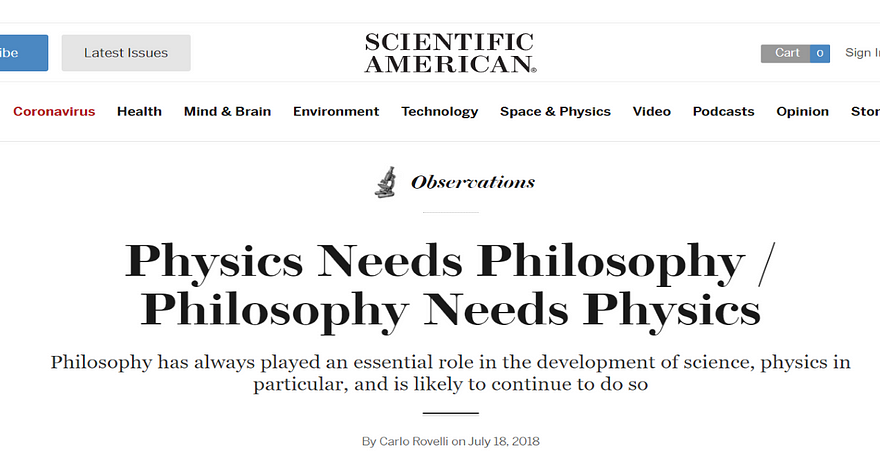
These two questions have been much debated in recent years. Particularly in the context of well-known scientists (such as Stephen Hawking, Laurence Krauss, Neil deGrasse Tyson, Lewis Wolpert, etc.) slagging off philosophy.
The usual debate centres around whether philosophy has influenced physics, not whether physics has — or can — influence philosophy.
Ironically, the Austrian physicist Erwin Schrödinger (1887–1961) seemed to reverse this stress. According to one biographer at least (i.e., Walter Moore, in his Schrödinger: Life and Thought),
“the philosophy of Schrödinger at this time does not appear to have been influenced by his physics”.
But this description of Schrödinger is anomalous anyway. The claim is about Schrödinger’s very own philosophy not influencing his physics, not the philosophies of all previous philosophers not influencing his physics.
So, despite that, Schrödinger was
“willing to admit that philosophy could influence physics”.
On the other hand, Schrödinger
“often said that one cannot derive philosophical conclusions from physics”.
Schrödinger’s words seem to put philosophy in a preeminent position, just as Arthur Schopenhauer (1788–1860) did. The latter once said that
“physics is unable to stand on its own feet, but needs a metaphysics on which to support itself, whatever fine airs it may assume towards the latter”.
This is interesting because many of the (for want of a better word) anti-philosophers and physicists I’ve debated with have assumed that philosophers believe (if with only a little of my own exaggeration) that physicists must consult the latest work in philosophy before they go to work to carry out their experiments.
That’s obviously not the case. And Schrödinger knew that too.
Schrödinger was arguing that physics (or simply the theories of physics) has a “metaphysics on which to support itself” even if any individual physicist has never read a single word of philosophy in his life. That is, there would still be metaphysics imbedded in such a physicist’s theories and indeed in much of his scientific thinking. So, even if he hadn’t read any philosophy, then that would be irrelevant: metaphysics would still be there. It would still be there both because he doesn’t realise it’s there and because he will have unconsciously adopted other physicists’ metaphysics instead. Thus, such a physicist’s happily-embraced ignorance of philosophy doesn’t mean that he actually has escaped philosophy.
And all this doesn’t have anything at all to do with such a physicist not ever having read Analysis or Mind or never having heard of Tim Maudlin or even David Hume.
Philosophical Naturalism
If a philosopher is a physicalist or naturalist, then one would guess (or even expect) that physics does, at least to some extent, influence his philosophy. But what about the other way around — philosophy influencing physics?
Historically, it’s well-documented that philosophy (or at least philosophers) did influence many famous physicists. The question is, then, how did it do so?
It can of course be said that not every physicist has been influenced by philosophy (as already argued). Then again, not every day-to-day physicist has been influenced by, say, the interpretations of quantum mechanics or even (I suspect) by quantum mechanics itself. Similarly, not every day-to-day mathematician has been influenced by any of the great names of mathematics.
So the matter of influence doesn’t need to apply to every physicist in every conceivable situation or when it comes to literally every physical theory. Of course not.
For one, the physicists who haven’t (knowingly) been influenced by any philosophy whatsoever may be (as it were) feeding off those physicists who have. Indeed, I suspect that’s true in many cases. Why is that? It’s largely because it was usually the revolutionary and/or important physicists who took philosophy seriously… Of course, this may not be true of literally every revolutionary and/or important physicist. However, even such a revolutionary physicist himself might have fed off those previous physicists who did take philosophy seriously.
Of course all these claims are hard to establish in terms of detail. Alternatively put, it would take much historical — as well as theoretical — data to demonstrate such (admittedly) broad claims.
My philosophy blog and flickr account:









No comments:
Post a Comment